
As our cities face a new normal in the context of the COVID-19 pandemic, the importance of understanding how we make our cities – through infrastructure, housing, workplaces and public space – has never been more important. If we are to have a ‘building the future’-led recovery to our economy we must seek to make the new versions of our cities green, safe and healthy.
The construction sector in Australia currently contributes 8% of GDP and employs almost 1.2 million people nationwide. The built environment is critical to pandemic recovery plans and the Australian university sector is well placed to support this through research and the training of professionals.
While the recent proposed changes to funding university places in our disciplines are welcomed, our research continues to attract less than 1% of Australian Research Council funding. As the peak body ADBED, we advocate for increased recognition of our sustained contribution to the development of Australian cities and regional centres.
Our graduates get jobs, but more importantly, jobs with purpose. Our graduates are work-ready, and our teaching methods are innovative and contemporary, drawing on technology from university researchers that feeds back into industry. We see ourselves as part of an eco-system with practice and the professions. Our graduates are also highly international, with the diaspora from our schools and faculties spread throughout Asia and the world.
Australian researchers are world leaders in understanding how the design of healthy cities can encourage walkable neighbourhoods, which can reduce impacts on our health systems and is especially relevant in the context of COVID-19. In parallel we are reconsidering policy for low-rise medium-density housing with generous private and public outdoor space as a development solution for future housing needs. Our construction workplace safety and advanced construction technologies research is also world class.
The breadth and richness of our research and the capabilities of our graduates justify considerable, sustained investment from government, business and our own universities to support the impact that built environment disciplines bring to the making of our cities.
Our professionals are the glue that connects engineering with health and wellbeing. Through working together we can bridge the divide between economic drivers and social agendas, we can demonstrate a link between long-term strategies for sustainable growth and immediate benefits, and we can show how the crisis of this pandemic can be turned into an opportunity to transform our cities and towns that enable our people to enjoy an improved quality of life.
ADBED Executive
Professor Martyn Hook, Dean, School of Architecture and Urban Design RMIT University, President
Professor Kerry London, Dean, School of Built Environment, Western Sydney University
Professor Helen Lochhead, Dean, UNSW Built Environment
Professor Jane Burry, Dean of Design, Swinburne University of Technology
